- Bernard Preston homepage
- Chickens
- Free Range Eggs
Free range eggs
True free range eggs command a premium-price and rightly so; or you can keep your own hens. Same as for humans, it's all about what they eat. Unlike us, sitting at our computers throughout the day they spend most of their time on their feet.
There's a lot of deceit in the industry; hens which spend ten minutes out in the sunshine, possibly half a glimpse of a touch of green grass and a few worms cannot produce true free range eggs.
Keeping your own fowls doesn't really give you cheaper-eggs; but they will be fresh and more nutritious. They add a whole new dimension to your garden; and quite a lot of work and time.
Their droppings make wonderful manure and will improve your vegetables. Don't let them near any seedlings though; but once mature they will not damage corn, climbing-beans and sunflowers, for example.
The flavour of young-cockerels, if you have the heart is like no chicken you will ever buy.
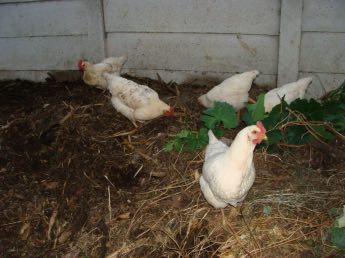
This page was last updated by Bernard Preston on 9th October, 2024.
If you carefully observe hens that are able to range freely you'll quickly notice four things.
- They are forever scratching in search of creepy-crawlies. They just love compost piles and the mulch around your plants for the promise of worms; slugs, snails and a million other little living creatures.
- They are constantly consuming large quantities of greens; broccoli, kale and cauliflower plants are particularly high on their agendas but every little weed will do.
- They particularly love green legumes like bush-beans, alfalfa and clover; and purslane plant too for the omega 3 perhaps.
- Toss them fresh corn on the cob and they will attack it hungrily but cracked maize is far less interesting; instead we bring it briefly to the boil together with whole grains of wheat to increase the choline content, making a lightly-cooked mash. Sprouting is also good.
Caged birds have no access to any of these worms, grasshoppers and greens; dried alfalfa and
corn make up most of their food. Maize is low in the especially important vitamin-like nutrient called
choline.
I'm no expert on keeping hens but I have a profound interest in nutrition and permaculture. Growing as much of our food as we possibly can has progressed to backyard-chickens.
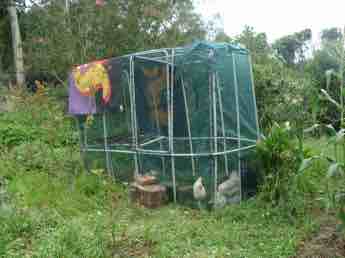
It all started with building one of the chicken tractor designs which had a floor area of about three square metres; with five-hens and a rooster.
The idea of a tractor is that you can keep moving it about your garden once they have cleaned up the remaining vegetation after the cabbages or green beans have been reaped.
It is a good concept; and a very satisfactory half-way house between caged birds and real free range eggs. They don't destroy your new seedlings that are popping up.
Sodexo
Sodexo is a very large company that focuses on the quality of life of the birds. Operating at 32,000 sites in 80 countries, they declared in 2016 their commitment to source only free-range eggs.
Their motivation has to do in the main with compassion in world farming; ours is that cage-free eggs are so much tastier and more nutritious.
Be warned though that some farmers allow their hens out for five minutes a day and call them free-range; we live in a world filled with deceit.
Free range eggs
Genuine free-range eggs are hard to come by; so we decided to keep our own hens.
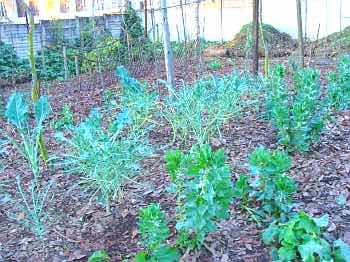 Chickens will destroy your greens
Chickens will destroy your greensI made a tactical error; I started letting them out to range freely for an hour in the evening. I could never bring myself to cage them permanently in the tractor again; they simply slept there overnight. Then we started to consider simple chicken coops.
Backyard permaculture has been for us a journey; we start with something but often end up doing it quite differently.
During the summer-months everything was moderately fine; there were plenty of grubs and greens to keep them happy. Except for the bush beans which they love. I soon realised that hens not surprisingly have an insatiable appetite for vegetable protein; some of our legumes took a hammering.
I didn't mind them rooting up every last shred of the clover but those beans were for our own pot, not for them.
A new strategy is growing as much of their food as possible; the corn was a huge success last summer. This coming year we'll have a new paddock for them with plenty of green beans as part of their nosh. That is what it takes if you want proper free-range eggs; planning and aforethought are obviously necessary.
Growing sunflowers is a new part of our mission to feed the hens from home; the bees too are busy.
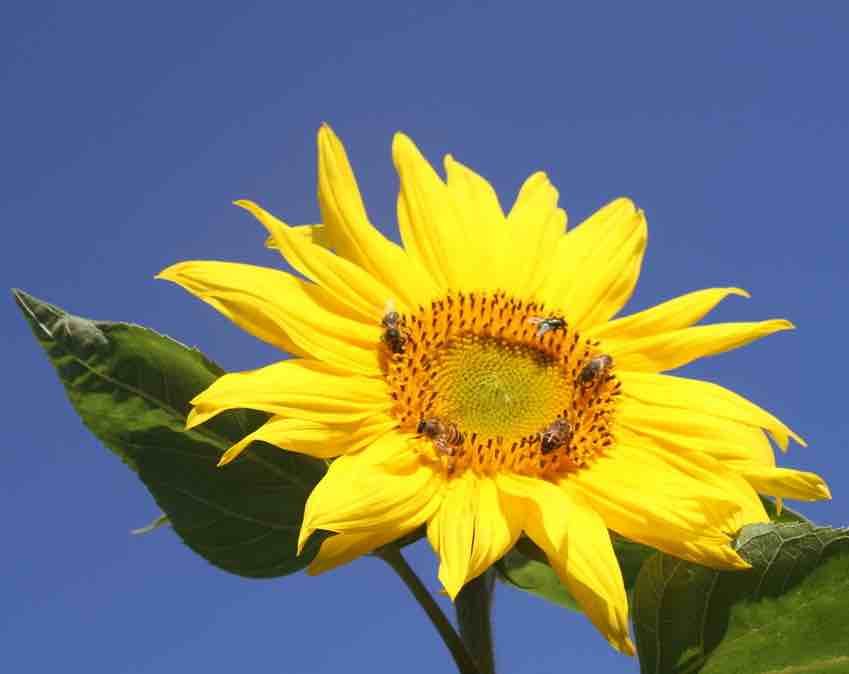
Six-birds in about 25 square feet in the summer months was a reasonable compromise provided we kept moving the tractor. But once winter arrived and our own family of four adults and three children demanded more eggs, there simply wasn't enough food for them.
The veggie garden started looking like a desert and when they began to attack the broccoli, Helen demanded a solution to the problem; I divided the area in two and then into three with the birds roaming freely in one half, fertilising and cleaning up the bugs. Periodically we swap, allowing them into the other territory. In fact, fourth and fifth paddocks are now complete.
Although they love most legumes, they have no interest in broad-beans; not even the seedlings. The hens can roam freely.
As we have a very large broad-bean patch every winter season we're considering a new strategy; they have the highest protein content of all legumes.
The hens show no interest in the sweet-potatoes in the background either; the compost heap is where they spend a good deal of their time. Foraging under the mulch is of course another great favourite.
They have two nests hidden in the sweet potatoes where they love to lay their cage-free eggs.
Supermarket deceit
A local supermarket that boasts about its concern for the environment and commitment to organic foods, sells so-called free range eggs for nearly double the normal price.
However on closer investigation, they keep 8 birds per square metre; I wouldn't call that free-range. Certainly compared to our hens they get very few creepy crawlies, greens and fresh legumes. Another company allows them out for short periods.
To be honest I think true free-range eggs are virtually impossible to buy except perhaps at farmers' markets.
If you want the best, you have to keep your own cage-free hens. Birds that can scratch and forage are not really compatible with the corporate environment.
In addition when I'm working in our general gardening area I take two hens with me; they go eagerly hunting for greens and a host of insects and worms. Your best chicken feed should be far better than any commercially produced food; if you want real free-range eggs.
Hens hide their eggs
Actually the very best of cage-free eggs is the joy of watching our three year old grandson hunting for the nests in the sweet potatoes.
Early in the morning and again when he gets home from play-school the first thing he asks for is a visit to the hens. It's the joy known only to grandparents who have the privilege of helping to rear the little people; and introducing them to a richer life.
The arrival of our new handsome cockerel was also the very best introduction to sex education; why can't he lay eggs was the first question.
Imagine the size of the lad's eyes the day he found this nest; they had been ferreting away their eggs unbeknown to us.
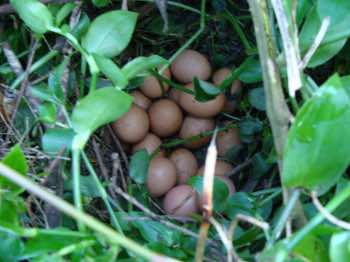
We had to learn about testing eggs for freshness; only one had gone bad.
Grandmere Jenny's favourite saying: "One should see what we are giving the family to eat; watch it growing."
- For Love of a Rose
Ex-caged layers
I had the good fortune to visit a free range egg farm last week in Kent, England. The owner gets her hens after the commercial farmers dump them, aged only 8 months old. I was shocked at the state of a group of ex-caged layers she had received the day before.
This poor creature aptly describes the term "hen-pecked."
Newsletter
Our newsletter is entitled "create a cyan zone" at your home, preserving both yourself and Mother Earth for future generations; and the family too, of course. We promise not to spam you with daily emails promoting various products. You may get an occasional nudge to buy one of my books.
Here are the back issues.
- Lifestyle and ideal body weight
- What are ultra-processed foods?
- Investing in long-term health
- Diseases from plastic exposure
- Intensive lifestyle management for obesity has limited value
- A world largely devoid of Parkinson's Disease
- The impact of friendly bacteria in the tum on the prevention of cancer
- There's a hole in the bucket
- Everyone is talking about weight loss drugs
- Pull the sweet tooth
- If you suffer from heartburn plant a susu
- Refined maize meal and stunting
- Should agriculture and industry get priority for water and electricity?
- Nature is calling
- Mill your own flour
- Bake your own sourdough bread
- Microplastics from our water
- Alternative types of water storage
- Wear your clothes out
- Comfort foods
- Create a bee-friendly environment
- Go to bed slightly hungry
- Keep bees
- Blue zone folk are religious
- Reduce plastic waste
- Family is important
- What can go in compost?
- Grow broad beans for longevity
- Harvest and store sunshine
- Blue zone exercise
- Harvest and store your rainwater
- Create a cyan zone at your home
Would you give your family an egg from this poor stressed hen, if you'd seen her?
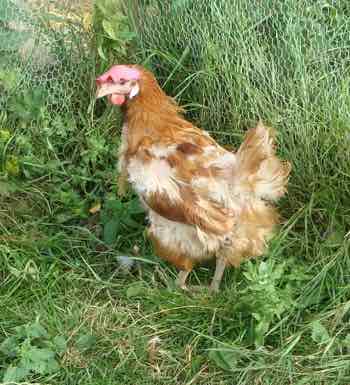
Compare the poor bird above with her hens below some months later after they have been released into their free-range garden. Animals in poor condition cannot possibly produce eggs of the same nutritional value as healthy fowls.
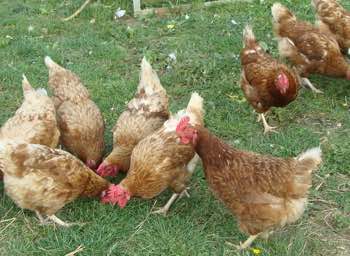
Best chicken feed
Commercial producers look to corn for carbohydrate and alfalfa for protein; in principle there's nothing wrong with either but real best chicken feed should also include a variety of greens and creepy-crawlies.
Greens like purslane plant are where they get their omega-3 fatty acids; cage free eggs have at least three times more. They reduce not only inflammation in our muscles and joints but also tumours.
Research published in J Nutr Biochem 2010 found that lactating women enjoying food enriched in omega-3 fish oil had less malignant breast tumours; and astonishingly even their offspring in later life had protection.
And in juxtaposition, on food high in omega-6 fatty acids such as corn and sunflower oil both they and their offspring had a higher incidence of breast tumours.
Olive oil is neutral, neither high in omega 3 nor 6.
Best chicken feed gives the birds access to fresh greens rich in omega-3.
According to Wiki purslane has more omega-3 than any other leafy plant; 350mg in half a cup of fresh leaves. The hens cleaned it up and we'll collect it now instead of weeding it out. I see it is also used widely both raw and cooked throughout the world for salads.
Next spring we will try it in our eggs Florentine breakfast; most of our omega 3 comes from freshly-ground flax seed; and fish like salmon and herring.
Then free range eggs are one of the best choline food sources. It's a lesser known B-vitamin that is profoundly important in preventing inflammation in the body; and birth defects such as spina bifida and cleft lip.
And of course if you have a cockerel you will need to know about best chick food too.
Simple chicken coops
In the long run we have found that a chicken tractor does not give the birds the protection they need from the elements, nor from the predators; it's fine during the day but for the nights I had to start looking at simple coops.
Free range eggs are truly wonderful but not if you arrive in the morning to find that a mongoose has decimated your flock.
Worm farms
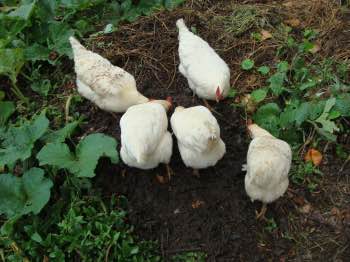
Here our hens are feasting on a shovelful from the worm farm; it is a gourmet meal.
At our permaculture green home we try to work with nature, rather than against it; we use no pesticides. All the kitchen waste goes to the wonder of worm farms; the "vermi-wee" as it is known feeds our plants and the surplus creepy crawlies go to the hens.
There can be very few commercial farms anywhere in the world where the hens feed better than ours. I would like to be able to eat the birds too but that I think would break our hearts.
Fipronil
Literally tons in the Netherlands were returned to producers in the summer of 2017 because of an unacceptably high level of a very toxic insecticide, Fipronil, in the eggs.
Fipronil is also the poison that is being fingered for "colony collapse disorder" in beekeeping. Seeds treated with the insecticide produce flowers that make the bees so disoriented that they cannot find their way home.
Fipronil has also been fingered by researchers as a cause of the fastest growing neurodegenerative condition, Parkinson's Disease[2].
Fipronil affects the neurotransmitter in the brain called GABA that regulates the communication between neurons; and in humans too. Google it by all means if you want to know more but it is complex.
The truth is that when we purchase food in the supermarket, we have no idea how it has been processed; or what toxic chemicals it has been exposed to. It is just one more reason to look to your own free range eggs if you are seriously concerned about your well-being.
Eggs Parkinson's disease is how we make sure we do not get that nasty condition. PD is the second most common neurodegenerative illness; and currently the fastest growing.
Crowned eagles

We had a famous guest who came to breakfast this week; a quite rare juvenile crowned eagle. For every 100,000 common white hens there's probably only one of this very unusual bird; perhaps for every million.
I can't begrudge him his breakfast thus, though we miss Snowy. It is part of the price of having free range eggs; you have unwelcome guests periodically.
Or should that be very welcome? Never before have I been so close to one of these majestic eagles.
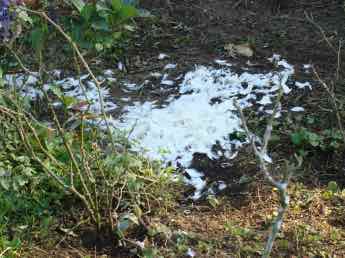
In the winter months when eagle food is in short supply, the hens are now confined to quarters unless we are working in the garden.
Chickens in the garden; let's get started.
Protecting your veggies
It is not only slugs, wild birds and Peter Rabbit that will raid Mr McGregor's garden; protecting your veggies from your own hens is important.
Our first chicken tractor was less than satisfactory; it stemmed from a failure to recognise that our hens needed a permanent roost, safe from the weather and a hungry mongoose.
This chicken tractor design is much simpler and lighter; and easy to move but the hens sleep elsewhere in a simple coop. You can either put the fowls in it, or place it over precious lettuces to keep them out.
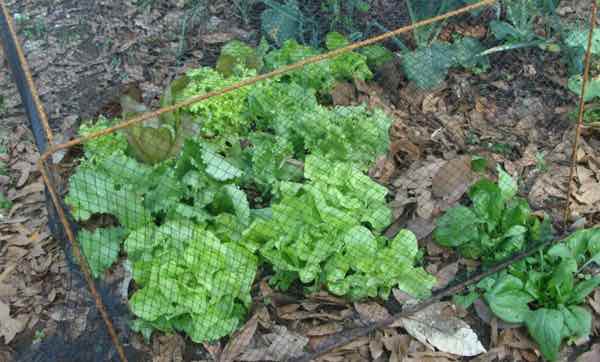
These lettuce cages were very easy to weld together. Covered with bird netting, they keep the hens out.
More difficult was the creation of different camps so the hens were restricted to one area only; we now have five.
One of the beauties of the permaculture lifestyle is the learning of different skills; building a vegetable garden fence has been indispensable. It was not rocket science but some inexpensive tools were necessary.
So was building a steel gate design; if I can learn to weld, so can you. It is inexpensive and no more dangerous that taking your car out on the road.
Useful links
Bernard Preston
Bernard Preston, a semi-retired DC just loves the outdoors; whether it's soaring in gliders, keeping bees or working in his organic garden, life is a joy. He borders on fanaticism when it comes to a sustainable world for his grandchildren; and making sure the girls in particular get enough omega 3 to prevent breast tumours. Cage free eggs is part of that thrust.
The boys get plenty of tomatoes and avocados for their prostates. Too many of us unnecessarily die horribly from a neoplasm.
In the early mornings he writes his Bernard Preston books. If you have enjoyed this site, you'll love his novels. Hang onto your hat. They are controversial; and dead cheap on your Kindle or smartphone. At a dollar apiece he joking says he is aiming for a million sales.
When browsing use right click and "Open Link in New Tab" or you may get a bad gateway signal.
Have you read my latest trilogy? Only $1.14 each. Hold onto your hat. Find A Family Affair by Bernard Preston at Amazon.
Did you find this page interesting? How about forwarding it to a friendly book or food junkie? Better still, a social media tick would help.
- Bernard Preston homepage
- Chickens
- Free Range Eggs
Address:
56 Groenekloof Rd,
Hilton, KZN
South Africa
Website:
https://www.bernard-preston.com